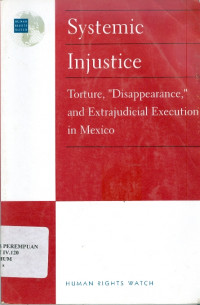
Text
Systemic injustice: torture, "disappearance," and extrajudicial execution in Mexico
Torture, "disappearances," and extrajudicial executions remain widespread in Mexico, despitenumerous legal and institutional reforms adduced by successive Mexican governments asevidence of their commitment to protecting human rights. Indeed, reforms have taken place, butthey have failed to abate, much less resolve, these serious, seemingly intractable problems. Inpart, this is because political leaders have been unwilling to ensure that existing humanrights-related laws are applied vigorously; authorities are more likely to close ranks and deny thateven well-documented abuses ever took place than they are to insist that those responsible bebrought to justice. The problem, however, runs far deeper than official toleration of abuses andimpunity. Human rights violations also stem from the justice system's ineffective protection ofindividual guarantees and its lax approach to human rights abuses. Through willful ignorance ofabuses or purposeful fabrication of evidence, prosecutors routinely prosecute victims usingevidence obtained through human rights violations, including torture and illegal detention, andjudges avail themselves of permissive law and legal precedent to condemn victims while ignoringabuses. Faced with this deeply troubling reality, the Mexican government has opted to treathuman rights as an issue to be managed politically, countered with facile statistics, or handledthrough insufficient reforms or initiatives.
Availability
| KP.1.000265 | KP.1 IND s | My Library | Available |
Detail Information
- Series Title
-
-
- Call Number
-
KP.1 IND s
- Publisher
- New York : Human Rights Watch., 1999
- Collation
-
vii, 123 hlm. ; 23 cm.
- Language
-
English
- ISBN/ISSN
-
1564321983
- Classification
-
KP.1
- Content Type
-
-
- Media Type
-
-
- Carrier Type
-
-
- Edition
-
-
- Subject(s)
- Specific Detail Info
-
-
- Statement of Responsibility
-
-
Other version/related
No other version available
File Attachment
Comments
You must be logged in to post a comment
 Computer Science, Information & General Works
Computer Science, Information & General Works  Philosophy & Psychology
Philosophy & Psychology  Religion
Religion  Social Sciences
Social Sciences  Language
Language  Pure Science
Pure Science  Applied Sciences
Applied Sciences  Art & Recreation
Art & Recreation  Literature
Literature  History & Geography
History & Geography